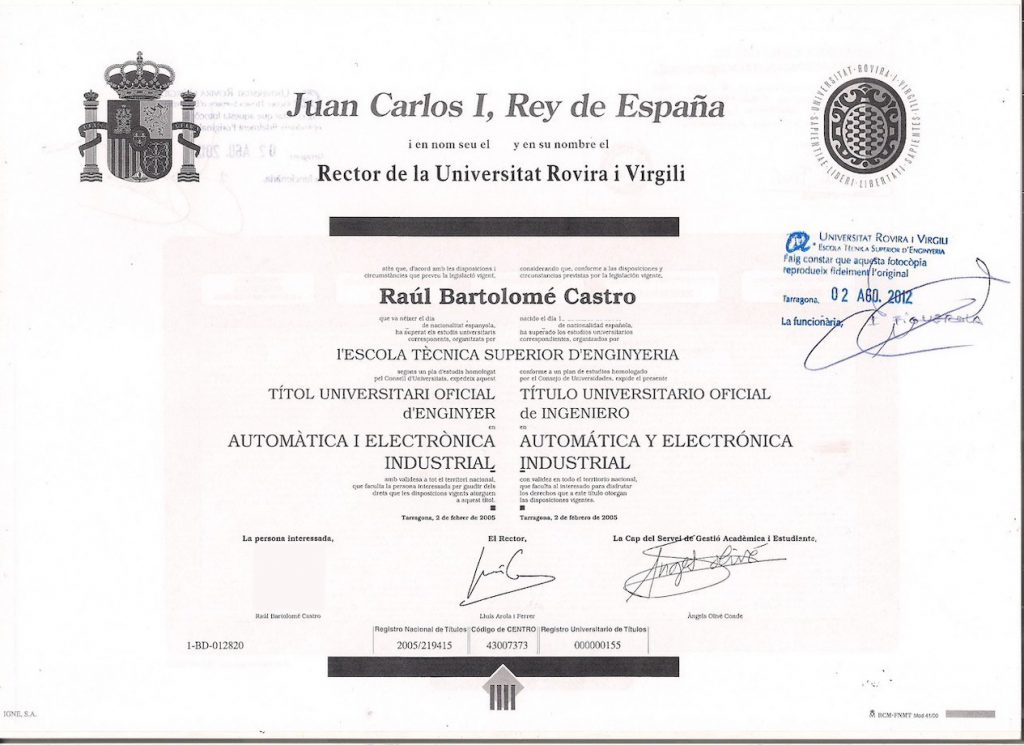
- Title: “Ingeniero en Automática y Electrónica Industrial”. In English: MEng, Automation and Industrial Electronic Engineering
- Years: 2001-2005
- University: Universitat Rovira i Virgili, Escola Tècnica Superior d’Enginyeria
- Location: Tarragona, Catalonia, Spain
- Thesis: “Sistema modular de adquisición de datos“. In English: Modular system of data acquisition
Training objectives
The title of Engineer in Automation and Industrial Electronics has a specialist profile in the technological fields related to control and electronics in the industrial environment.
The training objectives combine a solid practical training with a deep scientific-technical training, which enables these professionals to design, project, execute and direct any system, equipment or installation related to automation and electronics.
The student can choose between the following technological intensifications:
- Electronics: covers the capture, amplification and processing of physical quantities that occur in the industrial environment, with an emphasis on the integration of these signals in complex control systems. The most innovative technologies in the analysis and design of digital devices are studied. It delves into the design of static power converters for use in industry.
- Automatic: it covers the study of novel techniques for the control of industrial systems, such as expert control, fuzzy control and neuroboroso control, among others. The study of the implementation of physical control systems is addressed.
- Technology.
- Production.
- Computing.
Professional skills
The career of Engineer in Automation and Industrial Electronics offers graduates a profile clearly oriented to the professional performance of the following activities:
- Design, implementation, operation and maintenance of electronic and automatic systems.
- Implementation of technological innovations in the area of industrial control.
- Improvement of production processes through technological innovation in control systems.
Job opportunities
The Engineer in Automation and Industrial Electronics is trained to adapt to the technological evolution of the fields of automation and electronics, as well as to implement technological innovations in the area of industrial control. His training allows him to reach the positions of greater responsibility within the team in which he joins, and aspects such as the improvement of production processes through technological innovation in control systems will depend on him.
- Private sector: can provide services in industrial and service companies, in departments related to the design, operation and maintenance of electronic and automatic systems, mainly in companies in the electrical and electronic, telephony, communications, computer, robotic and cybernetic sectors , mechanical, electro-optic, electrostatic, electro-acoustic, etc. They can also work in consultancies.
- Free exercise of the profession: preparation of technical office projects and technical consulting, mainly.
- Public administration: civil servant or labor personnel of the technical bodies in all types of public administrations: European Union, state, regional and local, as technicians, inspectors or heads of service in areas of industry and commerce mainly.
- Research, development and innovation: research in public or private centers and in R + D + I departments of large companies.
- Public and private teaching: in public and private teaching centers, both in secondary schools and in universities.
Modules taken
| Subject | Credits | Type |
| Credit Award for First-Cycle Surplus | 10.5 | Free elective |
| Contemporary Political Thought | 4.5 | Free elective |
| Optimization and Optimal Control | 6 | Core |
| Industrial Electronic Systems | 6 | Core |
| Perception Systems | 6 | Core |
| Robot Control and Programming | 6 | Core |
| Integrated Production Systems | 6 | Core |
| Project Management | 6 | Core |
| Control Engineering I | 6 | Core |
| Digital Electronic Systems | 6 | Core |
| Modeling and Simulation of Dynamic Systems | 9 | Core |
| Mechanical Operations | 6 | Core |
| Control Engineering II | 6 | Core |
| Electric Drives | 6 | Core |
| Real Time IT Systems | 6 | Core |
| Final Project | 12 | Compulsory |
| Industrial Instrumentation | 6 | Compulsory |
| Industrial Telecomunication | 6 | Optional |
| Total Quality in Industry | 4.5 | Optional |
| Automotive Electronics | 4.5 | Optional |
| Industrial Work Experience | 12 | Optional |
| Mobile Robotics | 4.5 | Optional |
| Electronic Architecture of Satellites | 6 | Optional |